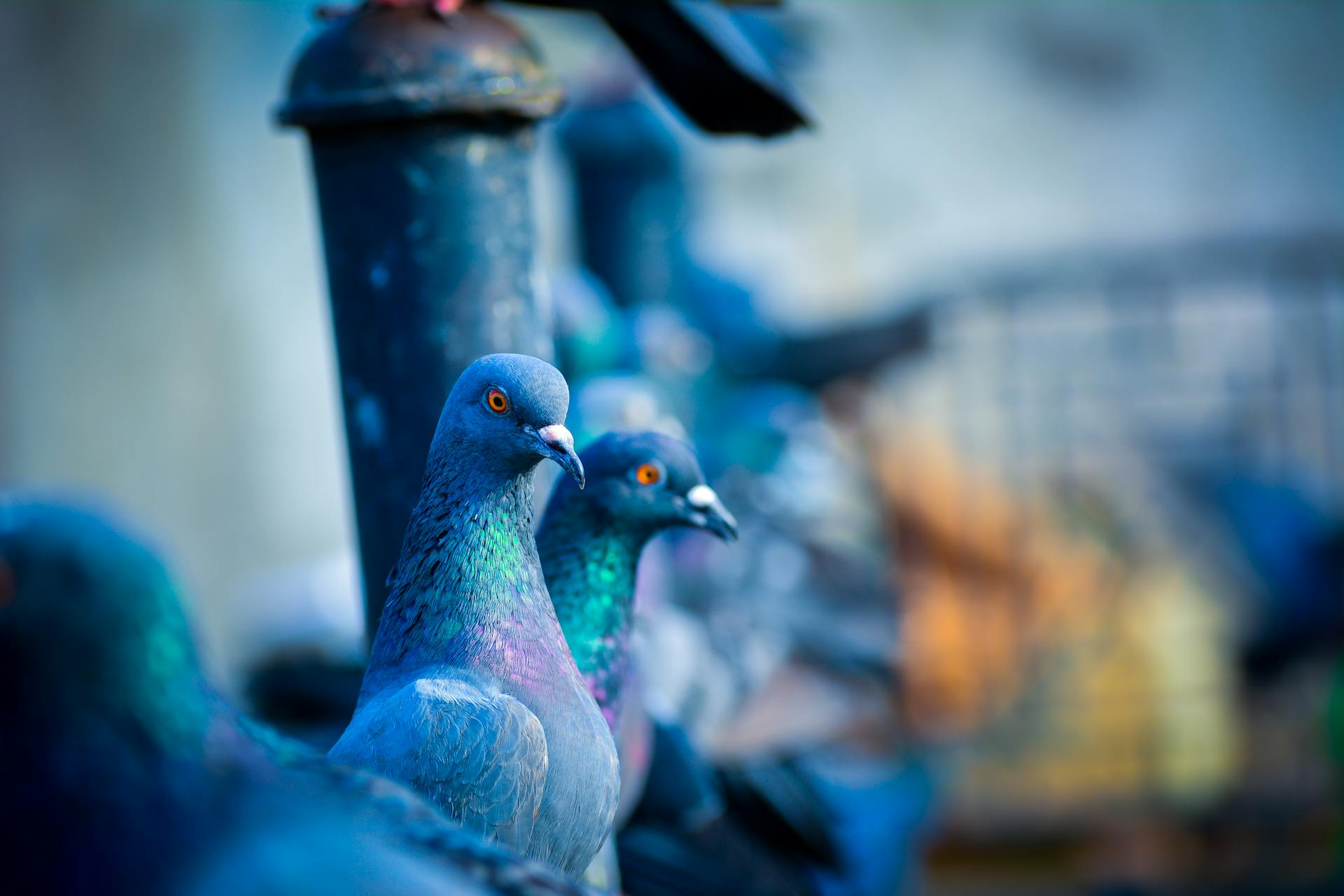
While pigeons might appear to be relatively unimpressive birds, they do have remarkable senses. For example, with their sense of smell, pigeons can detect odors that belong to predators that may pose a danger. One of the odors that tends to repel most pigeons is the scent of mothballs and other naphthalene-containing products.
The pungent aroma of mothballs often drives away pigeons who perceive it as a threat. The strong smell sends an alert signal to the pigeon's brain telling it that there may be aggression in the area and this encourages them to move elsewhere as soon as possible. In fact, if you want your garden or backyard to get rid of any pesky pigeons without having a major physical disturbance or using any sprays or chemicals, you could simply place some mothballs around your home and watch them fly away!
In addition to mothballs being among the smells most disliked by pigeons, other strong aromas like ammonia also trigger their defensive response against predators. This particular smell has been known for centuries by farmers and gardeners alike due its repellent effect on animals such as cats, rats and – believe it or not – even some birds like the dove which has recently been known for ruining crops! Therefore if you are ever faced with an unwelcome flock of doves tour area make sure ammonia is present so they can take off before damaging your plants or property.
To sum up when dealing with nuisance pests in your yard such as dangerous predators looking for food (or just plain bothersome city dwellers) always go for something safe yet effective like mothball solution! This way anyone in fear can breathe easy knowing those unwanted facedoff will be discouraged from entering for good!
Explore further: Poop Smell
What sound do pigeons find unpleasant?
If you have ever had the misfortune of having a (disproportionate) number of wild pigeons flocking to your yard, then you know that getting rid of them can be quite a challenge. As pesky as these birds may seem, there are some sounds that actively repel them and can be used to make them leave without having to resort to dangerous chemicals or overly aggressive tactics.
Pigeons find high-frequency sounds highly unpleasant, leading many people to use ultrasonic sound emitters as a deterrent method. Ultrasonic sound waves generally range between 20KHz and around 50KHz. This frequency range is inaudible for most humans, but it is extremely irritating for pigeons, not only sending signals of discomfort but also interfering with their ability to interpret incoming noises due to the strong gusts.
Another kind of loud noise which has been known to consistently drive away pigeons is music played at high volumes in open spaces. Rap music with thumping bass lines tend work best as they belt out at frequencies pigeons are more likely detect (over 14 10Hz). Also loud screeching noises like those from an owl or hawk - two major predators for the pigeon – do not bode well either!
In conclusion, though certain sounds such rodents and insects taking flight may call out for these birds’ attention, there are a few other environmental disruptions that will prompt their retreat such as those discussed above.
What taste do pigeons dislike?
It’s probably fair to say that pigeons don’t have a single taste that they all universally dislike. Pigeons have been around for centuries and have adapted to different climates and food sources, so their tastes might vary slightly depending on where they live or are found.
What we do know is that some flavors can be unpleasant for all types of birds, and this likely applies to pigeons as well. These unpleasant flavors would include things like overly spicy, sour or pungent flavors like garlic and onion.
Pigeons actually really enjoy sweet foods like fruit, grains, seeds and nuts which makes them a popular choice among humans who want to keep them as pets (they also eat other bird seed). However they don't necessarily enjoy overly sugary or artificial feelings (particularly processed foods) as these can cause health problems when eaten in excess.
So while it may not be possible to determine one specific taste disliked by all pigeons universally, its safe to say avoiding particularly spicy, sour or artificially sweetened foods is a good approach!
On a similar theme: How to Say I Hate You in Spanish?
How do pigeons react to strong odors?
Pigeons are known for their excellent sense of smell and can detect a wide variety of odors. When it comes to strongest odors, they tend to react in one of two ways; they will either be drawn to the smell or avoid it completely depending on the intensity and type.
When pigeons encounter strong smells such as gasoline, paint, or other toxic fumes, they can become disorientated and scared due to the overwhelming scent that invades their sensitive noses. Exposed for too long these extreme scents could cause them significant distress, including loss of energy or even death.
On the other hand, some strongly scented food such as grain or freshly mowed grass will often attract large crowds of pigeons as they flock towards its delicious aroma in search for a snack. The variety in smorgasbord options gives them an opportunity experienced interesting new smells which are especially attractive when found near open sources water like puddles or ponds where hungry birds can replenish fluids whilst getting nourishment from nutritious grains.
Overall pigeons have different reactions to strong odors depending on each individual situation since odor perception is affected by numerous factors including ambient temperatures and humidity levels. A bird’s regular exposure level may also influence its reaction since exposure over time may breed familiarity with certain aromas which can ultimately reduce discomfort caused by strong olfactory experiences that increase gradually overtime
Here's an interesting read: Dryer Sheet Smell
What colors do pigeons not like?
When it comes to pigeons and colors, most pigeon owners find that the birds aren’t particularly picky — they seem to be open to a range of colors. That said, there are certain colors that pigeons may be less fond of than others.
For starters, many experts believe that pigeons may have evolved not to favor very bright or fluorescent colors because these can be associated with potential predators like birds of prey. Such bright colors can unsettle an already skittish species like the pigeon. So if you’re looking for a color scheme for the coop or accessories within it, consider sticking to muted hues in shades like white and brown. This way we can help ensure our feathered friend will feel secure in its surroundings without confronting potentially intimidating color palettes.
Additionally, some evidence suggests that pigeons also don’t respond well to reds and oranges —so tread carefully when selecting decorations if either of these happens to be your favorite hue! For similar reasons as mentioned above (in regards to bright aesthetics), it is best practice not only when considering their habitat but also any feeders or birdbaths we use in the outdoors space where they live.
Ultimately as long as you restrict yourself from ultra-bright tones for their home and belongings, you should have no problem finding suitable decorating options for your pet pigeon — because let’s face it: even pigeons deserve a beautiful nest!
Consider reading: How to Clip Cat's Nails When They Hate It?
What texture do pigeons dread?
Pigeons are surprisingly adaptable birds, and they can generally adjust to living comfortably in a variety of environments. However, just like us, there are certain textures that even pigeons dread!
For example, if you're introducing a new food into the pigeon's diet or offering some type of new perching surface, it's likely that the pigeon will demonstrate an aversion for any texture that feels unusual or uncomfortable. Textures such as fuzzy fabrics, coarse surfaces and bristly perches may cause your pigeon to balk or fly away from their intended resting spot.
Another texture our feathered friends dislike is smooth plastic materials. These slippery surfaces can cause stress for some birds because they often feel unstable and leave them vulnerable to predator threats. If given the choice between a smooth plastic surface and one with more cushioning (such as soft fabric), most pigeons would opt for the latter!
Finally, heavy-duty plastic barriers such as grates and fences have been known to frighten pigeons due to their durable nature—they often feel closed off from potential escape routes during periods of high stress or alarm. Fortunately, these types of situations usually end up being short-lived since many types of grates will feature enough holes and grooves for your birdy buddy to fly through with ease should an emergency arise!
What type of environment makes pigeons uncomfortable?
Pigeons are a species of wild birds that have adapted to living in many diverse urban and rural environments, but that doesn't mean all environments make them comfortable. While we tend to think of them as ‘street pests’ and common keepers of city parks, their natural habitats are often not so populous. That said, there are certain environments that they may find uncomfortable or stressful - making it important to understand what type of environment might lead to an unpleasant experience for these birds.
For starters, pigeons can be particularly sensitive to loud noises such as construction activity (especially with drills and pile drivers) as well as vehicle horns. Loud music, either live or recorded is also something they will try to avoid by leaving the area entirely whenever possible.
Additionally, having too many people around can be very uncomfortable for pigeons since humans often scare them with their fast movements or keep throwing objects at them in an attempt chase away the bird. Too much artificial light is a major problem for some parts the pigeon populations because it disrupts their natural roosting patterns and daily rhythms - so changes in lighting can disrupt nests and cause discomfort for the mating pairs living there even if only partially illuminated during a typical night's sleep cycle (the term “Brooking Syndrome” was coined back in 1966).
Pooling water problems due sudden storms can also cause stress in pigeons just like any other bird species; while they usually make sure they stay safe above ground this still remains one environmental factor which youd want your avian neighbors feeling their best about!
Finally too much elevated temperature – especially inside enclosed buildings – might create an environment that would paradoxically make pigeons more prone to stress rather than relaxation; this is usually seen when people fail install some proper air conditioning units inside those places where otherwise everything else could've seemed perfect..until then! All things considered, creating a comfortable refuge for our feathered friends goes beyond providing food sources or avoiding extremes outdoor temperatures - its about respecting the need for some quiet tones/peaceful surroundings which will let them fully appreciate being alive & surrounded by beauty always present outdoors :)
Intriguing read: Why Do People Think Negatively of Christians?
Sources
- https://guideyourpet.com/smells-that-repel-birds/
- https://wildlifeanimalcontrol.com/pigeonnoise.html
- https://chickenmag.com/pigeon-sounds-and-noises/
- https://pestpointers.com/sounds-and-noises-pigeons-make-how-to-identify-them/
- https://pigeonpedia.com/what-do-pigeons-hate/
- https://extension.missouri.edu/publications/g9448
- https://www.thayerbirding.com/what-smell-do-birds-hate/
- https://www.pigeons.biz/threads/do-pigeons-eat-dead-pigeons.73373/
- https://huntingseasons.org/how-do-pigeons-know-where-to-go/
- https://brooks-show.fandom.com/wiki/Dread_Pigeons
- https://www.birdbgone.com/blog/what-smells-do-birds-hate/
- https://pestpointers.com/heres-where-pigeons-really-go-and-live-during-the-day/
- https://azpigeoncontrolremoval.com/get-rid-of-pigeons-5-smells-they-cant-stand-that-will-do-the-work/
- https://unianimal.com/do-pigeons-make-noise-1669446498/
Featured Images: pexels.com


